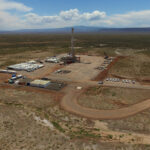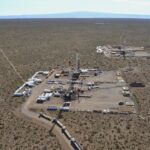HOUSTON – Brazil is exploring ways to import natural gas from Argentina’s massive Vaca Muerta formation, including the possible reversal of a pipeline now used for transporting Bolivian gas, as it looks to ease its gas deficit, Mines and Energy Minister Alexandre Silveira told Reuters on Thursday.
Brazil has become Latin America’s largest crude oil producer, but its gas output is insufficient to meet growing domestic demand, leading to increased imports of liquefied natural gas (LNG).
Brazil historically relied on Bolivian gas, but the Andean country’s dwindling output forced a supply contract renegotiation late last yearto extend the timeframe for completing deliveries to state-controlled oil company Petrobras PETR4.SA, the company said.
Dwindling Bolivian supplies have Argentina planning to cease imports through a gas line connecting the two countries later this year once a domestic pipeline is ready to bring gas to the country’s north from the Vaca Muerta shale play, a formation that rivals the U.S. Permian basin.
Brazil is encouraging Bolivia and Argentina to reverse the gas line flow so Vaca Muerta’s gas can reach the region’s North, a low-cost option that could better use the existing infrastructure.
“That gas would be very important for them (Bolivia), for its energy security,” said Silveira in an interview with Reuters on the sidelines of the CERAWeek conference, as it would help the Andean country offset declining reserves.
Brazil also is looking at gas transportation alternatives involving Uruguay and Paraguay, while encouraging more domestic onshore gas production, Silveira said.
As output from its prolific presalt region is set to plateau in the coming years, Brazil is looking at new frontiers for oil production, including the environmentally sensitive Equatorial Margin.
“Brazil could be losing an opportunity” if it does not drill there, Silveira said. Petrobras’ plans have been slowed due to the lack of environmental permits.
Minister Silveira also is readying participation in the next OPEC+ meeting in June after the country last year announced it would join the group in January as an observer.
Silveira plans to discuss energy transition during the meeting, he said, as Brazil tries to lead initiatives on tighter regulation of the transition and a global alliance for biofuels.
(Reporting by Marianna Parraga and Sabrina Valle in Houston, additional reporting by Fabio Teixeira in Rio de Janeiro; Editing by Gary McWilliams)
Lead image (Credit: Reuters)







